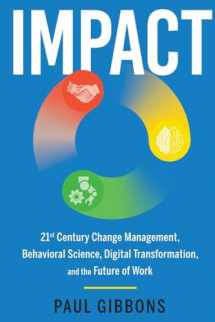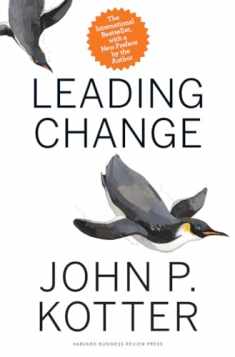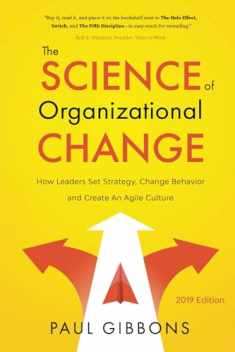
IMPACT: 21st Century Change Management, Behavioral Science, Digital Transformation, and the Future of Work (Leading Change in the Digital Age)
ISBN-13:
9780997651218
ISBN-10:
0997651210
Edition:
Illustrated
Author:
Paul Gibbons
Publication date:
2019
Publisher:
Phronesis Media
Format:
Paperback
352 pages
FREE US shipping
Book details
ISBN-13:
9780997651218
ISBN-10:
0997651210
Edition:
Illustrated
Author:
Paul Gibbons
Publication date:
2019
Publisher:
Phronesis Media
Format:
Paperback
352 pages
Summary
IMPACT: 21st Century Change Management, Behavioral Science, Digital Transformation, and the Future of Work (Leading Change in the Digital Age) (ISBN-13: 9780997651218 and ISBN-10: 0997651210), written by authors
Paul Gibbons, was published by Phronesis Media in 2019.
With an overall rating of 3.7 stars, it's a notable title among other
Workplace Culture
(Business Culture, Leadership & Motivation, Management & Leadership, Human Resources & Personnel Management, Human Resources) books. You can easily purchase or rent IMPACT: 21st Century Change Management, Behavioral Science, Digital Transformation, and the Future of Work (Leading Change in the Digital Age) (Paperback) from BooksRun,
along with many other new and used
Workplace Culture
books
and textbooks.
And, if you're looking to sell your copy, our current buyback offer is $0.58.
Description
Change is inevitable, whether it represents progress is up to us.
Astute leaders know that upskilling, culture change, and mindset are critical ingredients for successful digital change – but do not know how to change those quickly enough to keep up with pace of technological change. That is because our 20th century change models are not up to the challenge of 21st century digital transformation and the future of work – and that explains McKinsey’s finding that only 25% of digital transformations succeed.
In Impact, globally recognized culture change expert, Paul Gibbons gives leaders 21st century change tools and models that are based on up-to-the-minute research in behavioral sciences, complexity theory, agile methods, information science, and more.
Gibbons shows leaders that “the more technologically-enabled workplaces become (AI and robotics), paradoxically, the more important the “human” becomes – community, purpose, connection, empathy, relationships, and trust.”
He continues, “… central to the whole picture of changing how we change, of humanizing business, and of upskilling workforces, is leadership. In a world where advancing human capability is critical, leaders need to lead learning.” Then, using that idea of leader as learner, Gibbons illustrates and how learning can happen faster and more efficiently through understanding the latest research and making appropriate use of 21st century learning technology.
Impact is about leading change, and about those “upgrades” to the human side of organizations, leading, learning, communicating, changing, collaborating, deciding, and engaging. As computers do more of our thinking for us, taking over many of our cognitive tasks, our “competitive advantage” is in the social domain. Crudely, we can outsource some of our thinking, but not much of our collaboration. The upside is liberation from cognitive drudgery; the challenge is to raise our game and to become better at what makes us distinctively human – the social, the collaborative, the creative, the visionary.
Leaders will learn through case studies from leading business (such as Google and Microsoft) and insights from the latest “human sciences” which will show them that – “shared purpose is more important than traditional incentives; empathy, trust, and psychological safety beat old school methods of behavior change; behavioral science sometimes produces major results through small tweaks to the environment; constant engagement works better than town halls, workshops, and focus groups; and technology-enabled dialog with stakeholders works better than surveys do."
Gibbons, author of the change bestseller The Science of Organizational Change, illustrates the inauthenticity of using analog methods to drive digital change and the irony of using 20th-century change management practices with millennial workforces. Then Impact walks through the most hallowed change models, points out their flaws, and suggests updates, based upon principles such as: human-centered, technology-enabled, systemic, creative, scalable, and a based on a holistic understanding of what inspires today’s generation of workers.
The author brings a fresh, challenging voice, that of philosopher, scientist, and economist, to the world of change, strategy, and leadership. In 2017, he was voted top twenty in the world in culture change and nominated for the UK’s prestigious FRSA – Fellow of the Royal Society of Arts. His popular podcast Think Bigger Think Better was voted a top twenty philosophy podcast (out of thousands globally.) He has been a business school professor, entrepreneur, CEO, consultant, an investment banker and has degrees in neuroscience, philosophy, and psychology. He is Brexit refugee living in Colorado with his two sons and an international mindsports competitor.
Astute leaders know that upskilling, culture change, and mindset are critical ingredients for successful digital change – but do not know how to change those quickly enough to keep up with pace of technological change. That is because our 20th century change models are not up to the challenge of 21st century digital transformation and the future of work – and that explains McKinsey’s finding that only 25% of digital transformations succeed.
In Impact, globally recognized culture change expert, Paul Gibbons gives leaders 21st century change tools and models that are based on up-to-the-minute research in behavioral sciences, complexity theory, agile methods, information science, and more.
Gibbons shows leaders that “the more technologically-enabled workplaces become (AI and robotics), paradoxically, the more important the “human” becomes – community, purpose, connection, empathy, relationships, and trust.”
He continues, “… central to the whole picture of changing how we change, of humanizing business, and of upskilling workforces, is leadership. In a world where advancing human capability is critical, leaders need to lead learning.” Then, using that idea of leader as learner, Gibbons illustrates and how learning can happen faster and more efficiently through understanding the latest research and making appropriate use of 21st century learning technology.
Impact is about leading change, and about those “upgrades” to the human side of organizations, leading, learning, communicating, changing, collaborating, deciding, and engaging. As computers do more of our thinking for us, taking over many of our cognitive tasks, our “competitive advantage” is in the social domain. Crudely, we can outsource some of our thinking, but not much of our collaboration. The upside is liberation from cognitive drudgery; the challenge is to raise our game and to become better at what makes us distinctively human – the social, the collaborative, the creative, the visionary.
Leaders will learn through case studies from leading business (such as Google and Microsoft) and insights from the latest “human sciences” which will show them that – “shared purpose is more important than traditional incentives; empathy, trust, and psychological safety beat old school methods of behavior change; behavioral science sometimes produces major results through small tweaks to the environment; constant engagement works better than town halls, workshops, and focus groups; and technology-enabled dialog with stakeholders works better than surveys do."
Gibbons, author of the change bestseller The Science of Organizational Change, illustrates the inauthenticity of using analog methods to drive digital change and the irony of using 20th-century change management practices with millennial workforces. Then Impact walks through the most hallowed change models, points out their flaws, and suggests updates, based upon principles such as: human-centered, technology-enabled, systemic, creative, scalable, and a based on a holistic understanding of what inspires today’s generation of workers.
The author brings a fresh, challenging voice, that of philosopher, scientist, and economist, to the world of change, strategy, and leadership. In 2017, he was voted top twenty in the world in culture change and nominated for the UK’s prestigious FRSA – Fellow of the Royal Society of Arts. His popular podcast Think Bigger Think Better was voted a top twenty philosophy podcast (out of thousands globally.) He has been a business school professor, entrepreneur, CEO, consultant, an investment banker and has degrees in neuroscience, philosophy, and psychology. He is Brexit refugee living in Colorado with his two sons and an international mindsports competitor.


We would LOVE it if you could help us and other readers by reviewing the book
Book review

Congratulations! We have received your book review.
{user}
{createdAt}
by {truncated_author}




